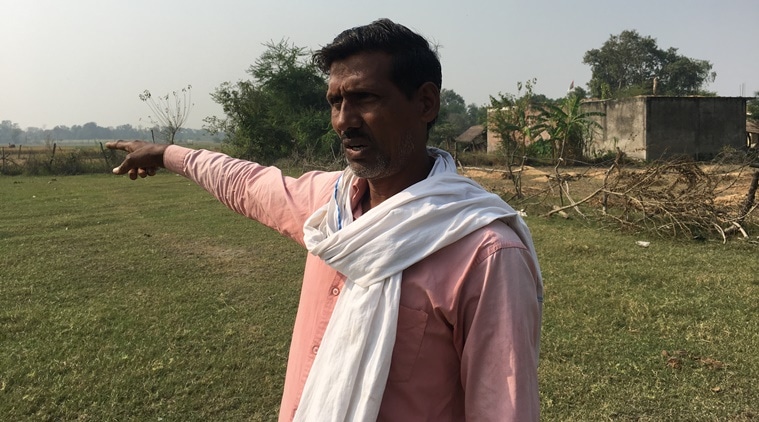
Despite the court’s order, however, it is almost impossible that the land will revert to Dalits of Ayodhya’s Barhata Manjha village who had sold it to a former Dalit employee of MRVT named Ronghai in 1992, and who had subsequently “donated” the land to the trust through an unregistered “donation deed”.
What did the ARO order say, and why?
On December 27, five days after The Indian Express investigation was published, the ARO court cancelled the transfer of land through the “donation deed”, ordered the vesting of the land with the state government, and forwarded the matter to the sub-divisional magistrate (SDM) in Ayodhya for “further action”.
The ARO’s order is in accordance with The UP Zamindari Abolition Act, 1950, which was applicable until 2016 in UP (and Uttarakhand). Section 157-A barred the sale, gift, lease or mortgage of SC land to a non-SC under normal circumstances. Section 166 said “every transfer made in contravention of the provisions of this Act shall be void.” And Section 167 said “the subject-matter of transfer shall, with effect from the date of transfer, be deemed to have vested in the State Government free from all encumbrances”.
If the SDM approves the ARO order, the land will be reverted to the government. But if Ronghai, who “donated” the land to MRVT, stakes claim to the land, an extended legal process will follow.
 Entry gate of MRVT in Ayodhya. (Express Photo by Shyamlal Yadav)
Entry gate of MRVT in Ayodhya. (Express Photo by Shyamlal Yadav)
What happens to people who may have bought any piece of this land from MRVT?
Story continues below this ad
Under Section 167 of the Act, “the trees, crops and wells existing on the land on the date of transfer shall, with effect from the said date, be deemed to have vested in the State Government free from all encumbrances”, and “the transferee may remove other moveable property or the materials of any immovable property existing on such land on the date of transfer within such time as may be prescribed.” Also, “it shall be lawful for the Collector to take over possession over such land or other property and to direct that any person occupying such land or property be evicted therefrom”.
On March 3, 2020, the Supreme Court ruled: “… if the transfer is void under the provisions of the Act, there is no justification to consider the request of the respondents on the ground that they are running the Hotel by availing loan from the financial institutions. When the transfer has been made in contravention of the provisions of U.P. ZA & LR (Zamindari Abolition and Land Reforms) Act, there is no ground for considering the questions of equity.” The order was passed in Additional Commissioner Revenue vs Akhalaq Hussain, who was running a hotel in Pithoragarh on land purchased from a Dalit. Revenue officials had cancelled the allotment.
It is important to note that relatives of officers such as erstwhile divisional commissioner M P Agrawal, former Ayodhya DIG Deepak Kumar, former chief revenue officer Purushottam Das Gupta, (now disqualified) MLA from Gosaiganj Indra Pratap Tewari alias Khabbu Tewari, and retired IAS officer Umadhar Dwivedi bought land from MRVT, but not out of this 21-bigha parcel.
So what is likely to happen in this case?
Story continues below this ad
Officials in the UP Board of Revenue said that given the clear provisions of the erstwhile ZA Act and the corresponding provisions of the LR Act (which came into force in 2016), relief is rarely granted in cases such of “illegal transfers”.
 Mahadev, at his village Barhata Majha, showing his agri land that was sold. (Express Photo by Shyamlal Yadav)
Mahadev, at his village Barhata Majha, showing his agri land that was sold. (Express Photo by Shyamlal Yadav)
And what happens to those who sold their land to Ronghai in 1992?
One of them, Mahadev, complained to the UP Board of Revenue in September 2019. As per records, Mahadev had got Rs 1.02 lakh for his nearly 3 bigha of land. When MRVT started selling parcels from it, Mahadev complained that his land had been “illegally transferred”.
The ongoing action has been taken on the basis of Mahadev’s complaint. An FIR was registered against Mahadev on December 4, 2019 under several sections of the IPC, and in March 2020 against a property dealer on the order of the Special Judge (ST/ST Act), Ayodhya, based on a complaint from Mahadev.
Story continues below this ad
Prabhakar Pandey, counsel for Mahadev, said: “I am fighting for the cancellation of the ‘bahinaama’ through which Ronghai took the land from my client in 1992.” The matter is pending before the civil judge (Junior Division) at Ayodhya.
According to Pandey, a separate case relating to another Dalit individual, who too had sold his land to Ronghai, is pending in the court.
 Ronghai lives in Sahavpur village near Prayagraj and works for a family associated to MRVT. He says he still gets a salary from MRVT.
Ronghai lives in Sahavpur village near Prayagraj and works for a family associated to MRVT. He says he still gets a salary from MRVT.
What role will Ronghai play in the proceedings that follow?
Ronghai, now in his sixties, told The Indian Express over the phone on Friday that he is not aware of the cancellation of the deed. Asked about the possibility of going to court, he said, “I don’t have the money for a legal battle, how will I do this?” He said he is still with MRVT, earning Rs 5,000 per month. He lives in Sahavpur village in Prayagraj, nearly 150 km from Ayodhya.
Story continues below this ad
Should more applications for cancellations of bahinama entries be filed by the over a dozen sellers of the 21 bigha in question, Ronghai will be made a party in every case.
The ARO’s order may also trigger new litigation in the civil courts in Ayodhya, as well as criminal cases by those who might have bought land out of the 21 bigha in question, their sellers, and other affected parties.
Newsletter | Click to get the day’s best explainers in your inbox



 Entry gate of MRVT in Ayodhya. (Express Photo by Shyamlal Yadav)
Entry gate of MRVT in Ayodhya. (Express Photo by Shyamlal Yadav) Mahadev, at his village Barhata Majha, showing his agri land that was sold. (Express Photo by Shyamlal Yadav)
Mahadev, at his village Barhata Majha, showing his agri land that was sold. (Express Photo by Shyamlal Yadav) Ronghai lives in Sahavpur village near Prayagraj and works for a family associated to MRVT. He says he still gets a salary from MRVT.
Ronghai lives in Sahavpur village near Prayagraj and works for a family associated to MRVT. He says he still gets a salary from MRVT.




































